Craving seafood but worried about freshness? Freezing is a fantastic way to savour your favourite catches long after they're caught. But how long does frozen seafood last, especially in Singapore's climate? Join us as we explore the key guidelines for maintaining the taste and quality of your seafood.
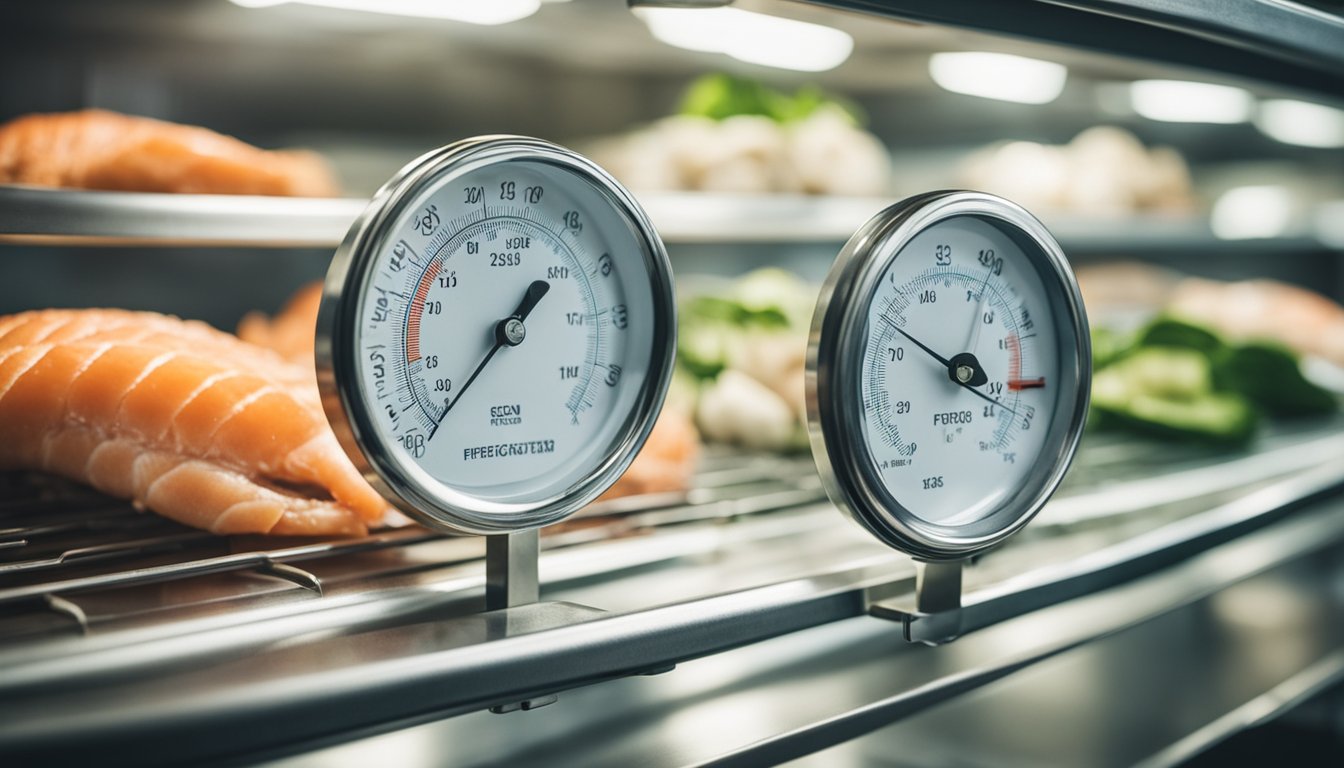
Freezing seafood is a popular method of preserving this culinary delicacy in Singapore. While freezing extends its lifespan, proper storage is crucial to maintain quality. Factors like seafood type, storage method, and temperature significantly impact its longevity.
To ensure your frozen seafood remains safe and delicious, follow essential storage and handling guidelines. In this blog, we'll delve into the fundamentals of freezing seafood in Singapore, covering optimal storage practices and the shelf life of various seafood.
Key Takeaways
- Freezing seafood is a common practice in Singapore due to its popularity.
- Proper storage is essential to maintain the quality and safety of frozen seafood.
- Factors like seafood type, storage method, and temperature affect frozen seafood's lifespan.
Discover a world of convenience and flavour with our frozen seafood selection! Before diving into storage tips, explore our extensive collection of live, fresh, and frozen seafood. Elevate your next meal with irresistible seafood delights!
Fundamentals of Freezing Seafood in Singapore
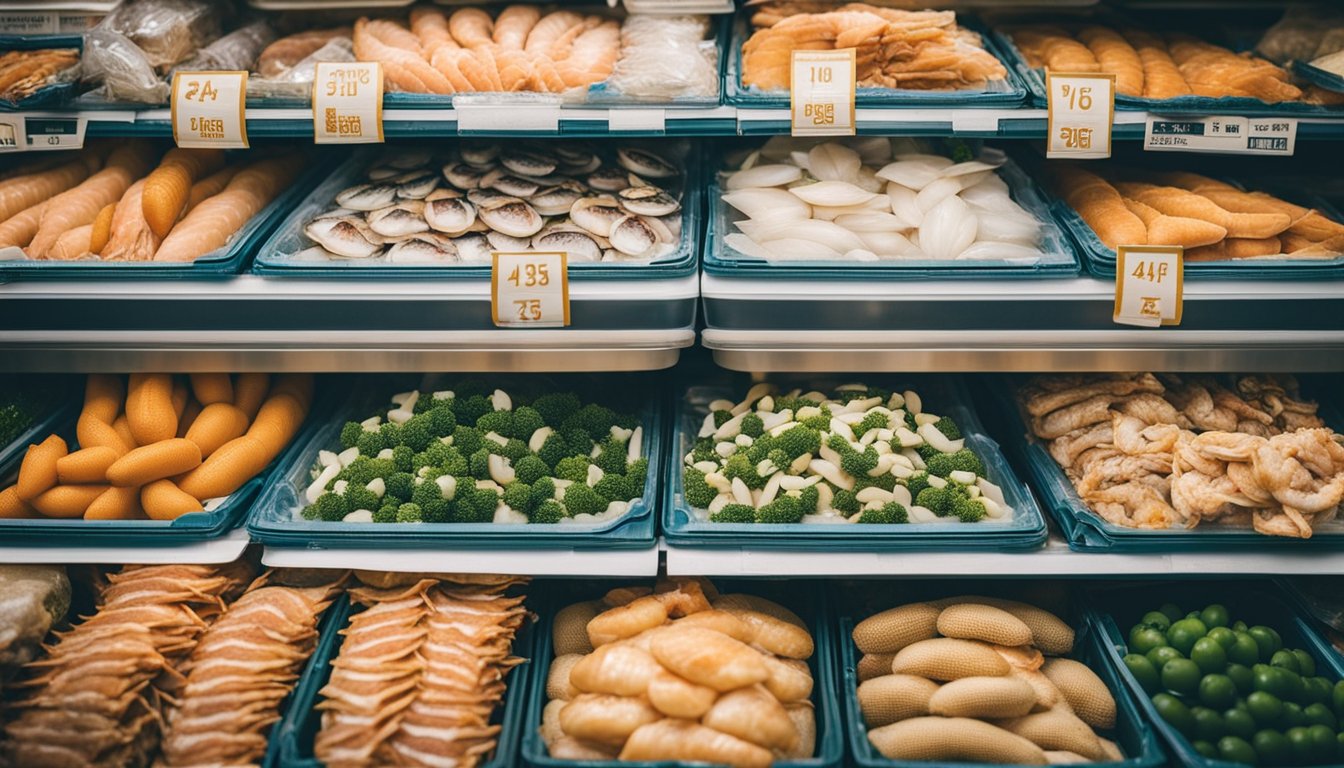
Freezing seafood lets you enjoy your favourite marine delights anytime with ease. You can maintain its great taste and texture by following some simple guidelines.
To maintain optimal quality, it's essential to freeze seafood rapidly. This process, known as flash freezing, minimises the formation of ice crystals that can damage the delicate flesh. Singapore’s warm climate necessitates a freezer temperature of -18°C or lower to preserve seafood.
While freezing significantly slows down bacterial growth, it's important to remember that it doesn't eliminate all microorganisms. Proper handling of frozen seafood is crucial to prevent foodborne illnesses.
By following these guidelines, you can confidently enjoy the taste of the ocean whenever you crave it.
Below is a table that provides an estimate of how long different types of seafood can last when stored in the freezer at -18°C or lower:
| Type of Seafood | Frozen Shelf Life |
|---|---|
| Fish | 3-8 months |
| Shrimp | 3-6 months |
| Scallops | 3-6 months |
| Squid | 3-6 months |
| Clams |
2-3 months (Live), 3-6 months (shucked) |
Note: The frozen shelf life estimates provided in this table are based on information from the USDA (US Department of Agriculture) and SFA (Singapore Food Agency). It's important to remember that these are estimates, and actual shelf life can vary depending on factors such as the freshness of the seafood, packaging, and storage conditions. Proper handling is key to maintaining its freshness and safety.
Optimal Storage Practices for Frozen Seafood
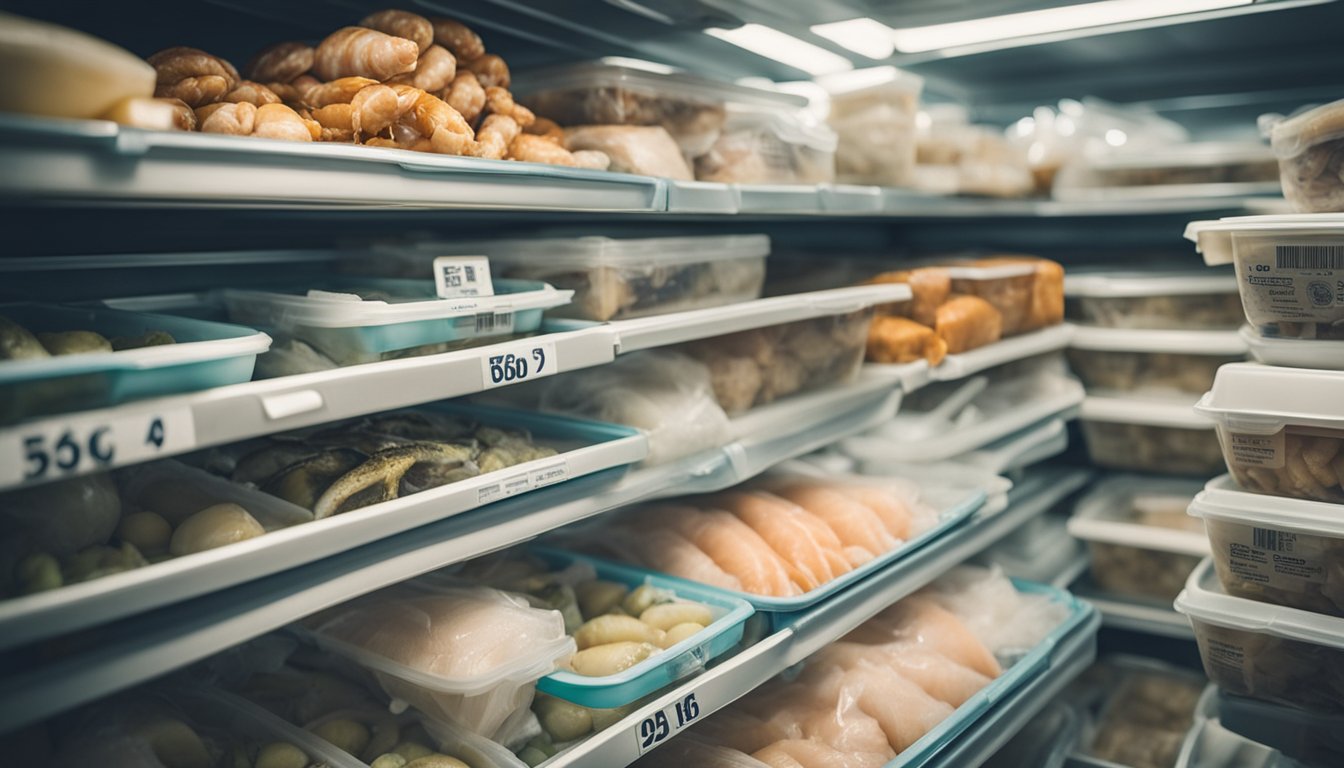
As a seafood aficionado, you understand the delicate balance of taste and texture that defines exceptional seafood. Proper storage is essential to preserving this culinary treasure. In Singapore, where fresh seafood isn't always readily available, freezing offers a convenient solution. Let's delve into the best practices for storing frozen seafood to ensure it remains as delicious as the day it was caught.
Temperature Guidelines
The golden rule of frozen seafood storage is temperature. Your freezer should maintain a steady temperature of -18°C (0°F) to effectively inhibit bacterial growth and preserve freshness. Place your seafood in the coldest part of your freezer for optimal results.
Packaging Tips
Packaging your frozen seafood correctly is just as important as storing it at the right temperature. Proper packaging can help prevent freezer burn and protect the seafood from contamination. Here are some packaging tips to help you store your frozen seafood correctly:
-
Use airtight containers or freezer bags to store your seafood. Make sure to remove as much air as possible from the packaging before sealing it.
-
Label your seafood with the date of purchase and the expiry date. This will help you keep track of how long the seafood has been in the freezer and ensure that you use it before it goes bad.
-
If you have purchased seafood that is already frozen, make sure to transfer it to a freezer bag or container before storing it in the freezer. This will help protect the seafood from freezer burn and contamination.
By following these optimal storage practices, you can keep your frozen seafood fresh for longer and enjoy its delicious taste and nutritional benefits. Remember to always check the expiry date before consuming any frozen seafood and discard any seafood that looks or smells off.
Determining the Shelf Life of Different Seafood Types
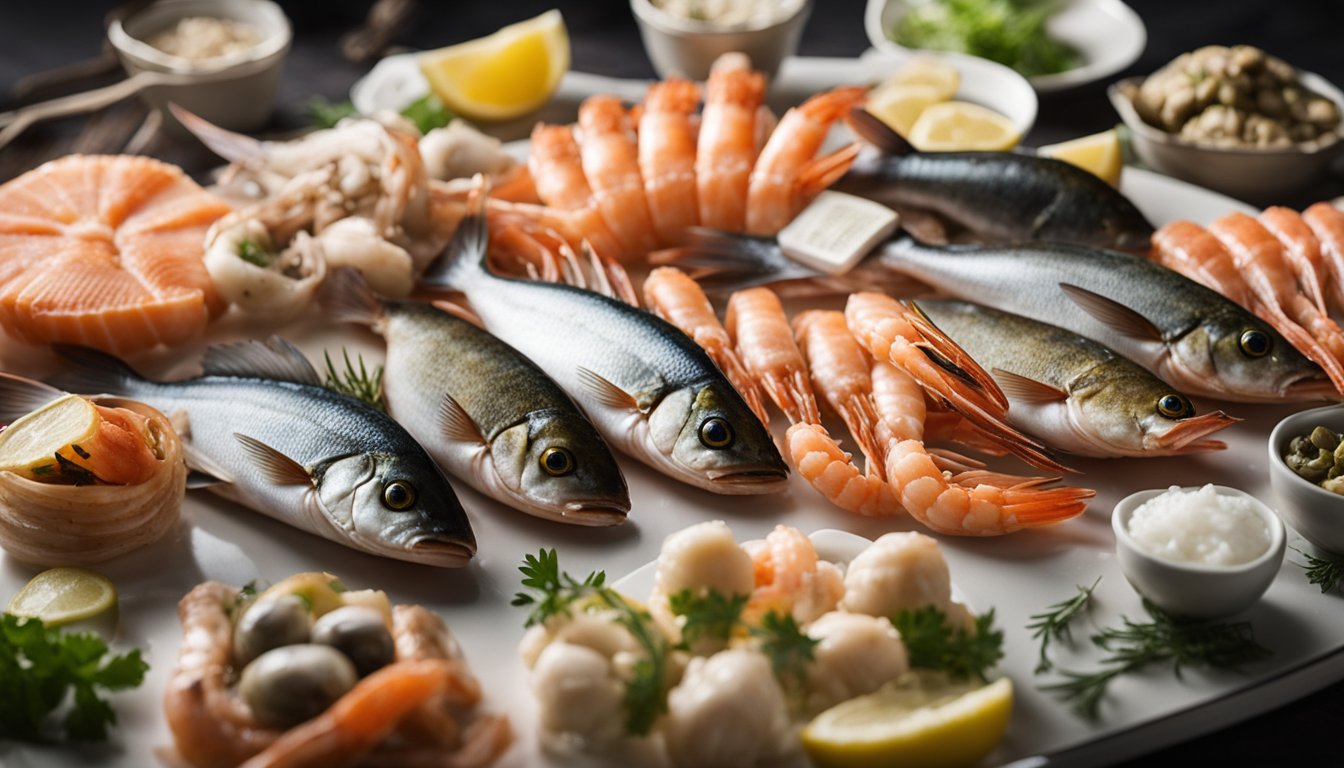
Are you still wondering how long your frozen seafood will stay fresh? The truth is, it depends. The lifespan of frozen seafood varies based on the type, handling, processing, packaging, and storage conditions. Let’s dive into the details.
Finfish Durability
Finfish, such as salmon, tuna, and cod, can last in the freezer for up to six months. However, the shelf life can vary depending on the species and the quality of the fish. To ensure the best quality, it's recommended to use fresh fish within two days of purchase.
Shellfish Preservation
Shellfish, such as shrimp, scallops, and mussels, can last in the freezer for up to three months. However, the shelf life can vary depending on the species and the quality of the shellfish. It's recommended to use fresh shellfish within one to two days of purchase.
To preserve the quality of shellfish, it's important to store them properly. Shellfish should be stored in the coldest part of the refrigerator, at a temperature between 0°C to 4°C. They should also be kept in a sealed container or wrapped tightly in plastic wrap to prevent moisture loss.
The shelf life of frozen seafood can vary depending on the species and quality of the seafood. To ensure the best quality, it's important to store seafood properly and use fresh seafood within a few days of purchase. By following these guidelines, you can enjoy delicious seafood dishes in Singapore all year round.
Safety and Quality Indicators for Thawed Seafood

When it comes to thawed seafood, there are a few safety and quality indicators to look out for to ensure that the seafood is still fresh and safe to eat. Here are two key indicators to keep in mind:
Visual Inspection
The appearance of thawed seafood can be a good indicator of its quality. Look for the following when inspecting your seafood:
- Flesh colour: The flesh of the seafood should be translucent and shiny. If it appears dull or discoloured, it may be a sign that the seafood is not fresh.
- Texture: The texture of the flesh should be firm and springy. If it feels mushy or slimy, it may be a sign that the seafood is not fresh.
- Ice crystals: If there are large ice crystals on the seafood, it may be a sign that it has been thawed and refrozen. This can affect the quality of the seafood.
Odour Assessment
Another way to tell if thawed seafood is fresh is by smelling it. Here are a few things to keep in mind:
- Fresh seafood should have a mild, ocean-like smell. If it smells overly fishy or has a strong ammonia-like odour, it may be a sign that the seafood is not fresh.
- Some seafood, such as shrimp, may have a slightly sweet smell. This is normal and not a cause for concern.
- If you are unsure about the odour of your seafood, it is best to err on the side of caution and discard it.
By keeping these indicators in mind, you can ascertain if the thawed seafood you are consuming is fresh, safe, and of high quality.
Frequently Asked Questions
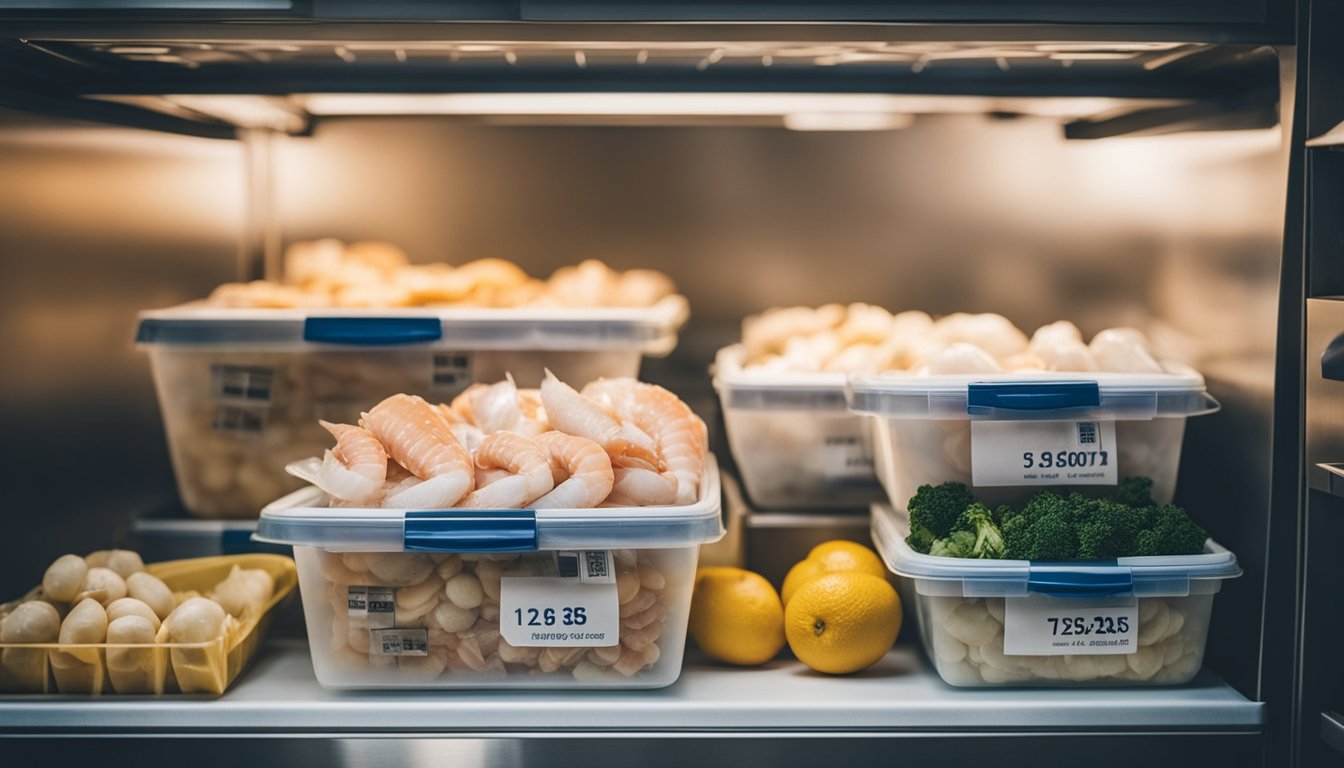
What are the best tips for keeping my frozen fish fresh and delicious?
Store your frozen fish in the coldest part of your freezer, usually at the back. Wrap it tightly in plastic wrap or aluminium foil to prevent freezer burn. Label the package with the freezing date to track its freshness.
How can I tell if my frozen mussels are still good to eat?
Frozen mussels can be a delicious addition to any seafood dish, but you want to make sure they are still safe to eat. If your frozen mussels are open, discard them. Closed mussels should be safe, but for extra precaution, thaw and smell them. If there's an off odour, it's best to toss them out.
How long can I keep frozen oysters?
Freezing your oysters can be a great way to keep them fresh for longer, but knowing how long they will stay safe to eat is important. Frozen oysters can last up to three months in the freezer, but it is important to make sure they are properly wrapped and labelled.
